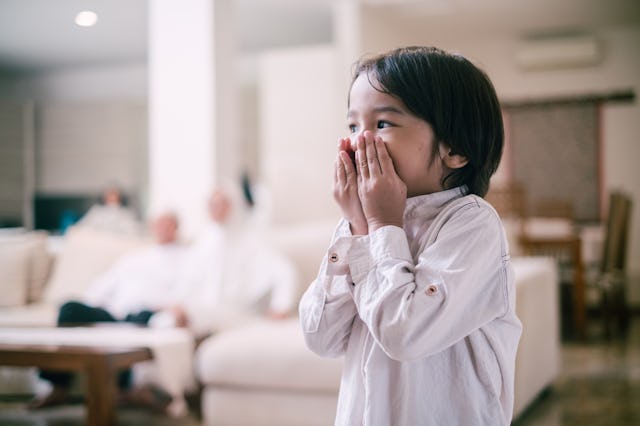My Kid Swears ~A Lot~ — But Only At Home. Can I Just Let It Slide?
How to handle your little foulmouth, according to experts.

We’ve all been there: You drop something, it breaks, and you shout, “Sh*t!” only to realize your kids and their big ears are nearby. In my house, the swear jar is almost exclusively filled by me. Miraculously, my son rarely uses expletives. Maybe my use of them has dubbed them “uncool,” or maybe he just has better manners. (It happens!) Whether your kid swears in good fun or all the time, the question remains: What do you do about it, if anything?
Public behavior and private behavior can absolutely be different things. Kids understand this from a young age — it’s OK to walk around the house naked; it’s not OK to streak around the playground naked. So, in theory, if your kids are mature enough to discern the difference between dropping an f-bomb while playing a video game at home (allowed) and dropping an f-bomb in math class (definitely not allowed), they fundamentally get the difference between public and private behaviors.
The problem is, while kids may be able to control themselves — in private or public — when things are running smoothly, all bets are off where big emotions are involved. Feelings like excitement, frustration, sadness, and boredom (feelings they’re likely to experience at school, the playground, or home) can all lead to highly charged emotional responses. If swearing is a default response to emotions at home, it’s going to be a default response elsewhere.
So, do you discipline them or not?
Whether or not you tolerate swearing at home is a decision only you and your parenting partner can make, but the truth is it’s difficult for kids to have a level of self-control that prevents zero slip-ups. In fact, it’s difficult for grown-ups to manage this. But before your kid ends up in the principal’s office, there are plenty of ways to discourage the use of expletives without harsh discipline.
Ask anyone who has parented through the preschool years, and they’ll agree that, sometimes, no reaction is the best reaction. Children love to push boundaries, and swearing may be one of the ways they’re testing the waters. If you suspect your kids are trying to get a rise out of you, ignoring or diffusing the situation can be the simplest solution.
Allison Wilson, senior director of curriculum and innovation at Stratford Schools, wants parents to also consider the source: Kids may be swearing because they’re mimicking adult behavior or for social acceptance among their peers.
How do you keep your kid’s bad language at bay?
If you want to curb the swearing at home, Donna Whittaker, VP of curriculum and education at Big Blue Marble Academy, reminds parents, “Foul language is typically said with great passion and enthusiasm; this is why children notice and tend to mimic and use these words. If we said the word ‘carrot’ with as much gumption as we did expletives, children would say ‘carrot’ if they stubbed their toe or their sibling broke their favorite toy.”
Whitaker also encourages parents to think about times they swear, do their best to avoid it, and, if they do slip up, acknowledge their mistake with a simple, “Oops! I shouldn’t have said that!”
Substituting a cute or disarming word in place of a swear word is a solution familiar to any “son of a nutcracker” out there. Wilson reminds parents this is a powerful tool they can use. “Discuss why language is inappropriate and then brainstorm alternative words,” she suggests. “For example, you might select a phrase such as ‘silly banana’ or ‘snap’ as a replacement for the word.”
And, of course, there’s always the gentle punishment of a swear jar. If the kids swear, you get some petty cash (be sure they’re dipping into their allowance and birthday money to pay up). If you swear, they get a nice ice cream fund. Kind of a win-win.